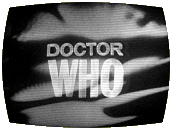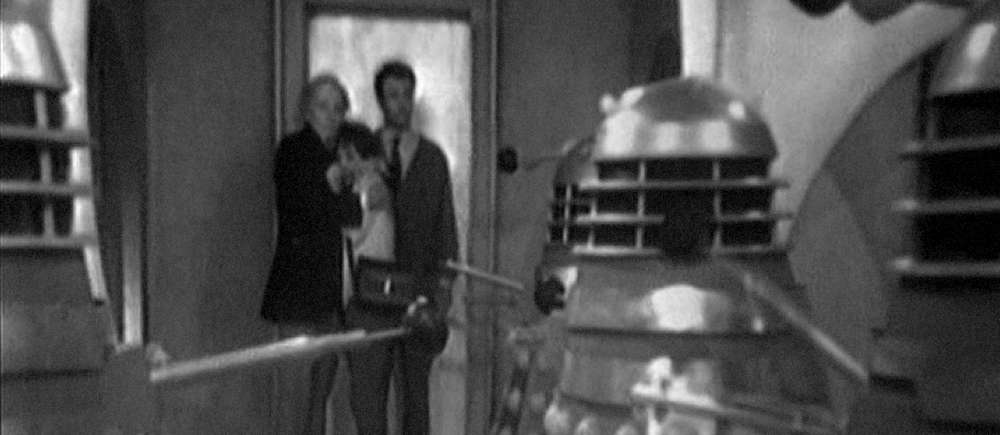. The TARDIS arrives on the distant planet Skaro, which seems at first to be uninhabited, except for fossilized animals. When the Doctor, Susan, Ian and Barbara discover a city constructed by an advanced civilization, there is a difference of opinion on whether or not to explore it. But the Doctor deems it necessary due to a shortage of mercury in the TARDIS’ fluid link system. After wandering aimlessly in the city for a while, the travelers discover two horrifying things – their growing fatigue is a sign of radiation sickness from Skaro’s toxic environment, and there are still living creatures inhabiting Skaro. One race, the pacifist humanoid Thals, try to maintain their primitive culture in the face of adversity. The other race, metallic monstrosities known as the Daleks, intend to wipe the Thals out – along with the Doctor and his companions, unless they assist the Daleks in their genocidal plan.
The TARDIS arrives on the distant planet Skaro, which seems at first to be uninhabited, except for fossilized animals. When the Doctor, Susan, Ian and Barbara discover a city constructed by an advanced civilization, there is a difference of opinion on whether or not to explore it. But the Doctor deems it necessary due to a shortage of mercury in the TARDIS’ fluid link system. After wandering aimlessly in the city for a while, the travelers discover two horrifying things – their growing fatigue is a sign of radiation sickness from Skaro’s toxic environment, and there are still living creatures inhabiting Skaro. One race, the pacifist humanoid Thals, try to maintain their primitive culture in the face of adversity. The other race, metallic monstrosities known as the Daleks, intend to wipe the Thals out – along with the Doctor and his companions, unless they assist the Daleks in their genocidal plan.
written by Terry Nation
directed by Christopher Barry and Richard Martin
music by Tristram CaryGuest Cast: Robert Jewell, Kevin Manser, Michael Summerton, Gerald Taylor, Peter Murphy (Daleks), Peter Hawkins, David Graham (Dalek voices), John Lee (Alydon), Philip Bond (Ganatus), Virginia Wetherell (Dyoni), Alan Wheatly (Temmosus), Gerald Curtis (Elyon), Jonathan Crane (Kristas), Marcus Hammond (Antodus)
Broadcast from December 21, 1963 through February 1, 1964
LogBook entry & review by Earl Green
One of the best William Hartnell stories, The Daleks not only introduced the alien creatures which put the show on the map, but it’s a good story in its own right. At nearly twice the length of An Unearthly Child, The Daleks is an intelligent introduction for the Doctor’s mortal foes, though many fans find the very 60s pseudo-science of this seven-parter laughable (what with the TARDIS requiring mercury to travel, and a mere vinyl jacket being the only weapon necessary to incapacitate the Daleks).
I also have to single out Tristram Cary‘s musical score, very creepy yet not dated. It’s also very electronic, but not in the swooping-oscillator way that characterizes the show’s theme tune as a thing of the 60s. Given appropriate visuals, Cary’s music could be lifted out of this episode and would feel perfect in any current thriller. It’s a disappointment that no one has engineered and released a new recording of the music from The Daleks. (Ed. note: turns out the original recordings were preserved and have now been released so scratch the re-recording request!)
At seven 25-minute episodes, The Daleks bogs down a bit in the middle, especially with the almost-too-lengthy trek back to the Dalek city. But the story also contains some surprisingly mature concepts and moments, including Ian’s effective demonstration of the danger facing the Thals if they refuse to fight for their survival, the Doctor’s insistence that the Thals must follow their own destiny without any furhter assistance from him, and the hints of potential romance between Barbara and a Thal leader (and some slightly less obvious hints that Susan is fully capable of developing a typical teenage crush, too). The Doctor also provides an anti-heroic surprise when he reveals that the mercury “problem” was in fact a ruse so he could satisfy his curiosity about the city.
The Daleks would return again…and again…and again. And by striking such a chord with viewers – especially kids – in Britain, they transformed Doctor Who forever.

